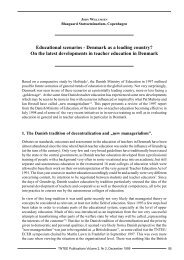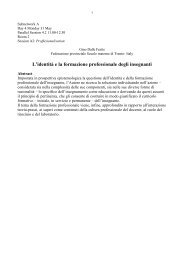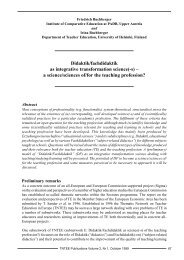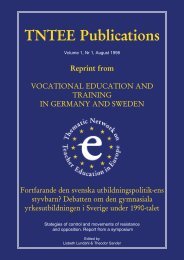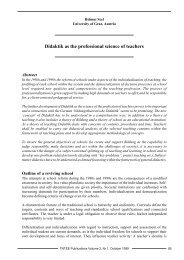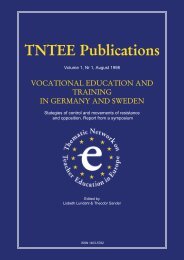TNTEE Publications - Didaktik/Fachdidaktik
TNTEE Publications - Didaktik/Fachdidaktik
TNTEE Publications - Didaktik/Fachdidaktik
Create successful ePaper yourself
Turn your PDF publications into a flip-book with our unique Google optimized e-Paper software.
“Allgemeine <strong>Didaktik</strong>” (“General Didactics”) and “<strong>Fachdidaktik</strong>” (“Subject Didactics”)<br />
(ii) How have learning situations in the social context of a classroom to be arranged, so that students<br />
find ample opportunity for individual and active learning? An optimal support of the learning<br />
processes of each student by the teacher may be defined as the aim of these efforts. A balanced<br />
relationship between autonomy of the learner and external guidance by the teacher has to be<br />
found.<br />
Following gestalt-psychology, learning processes of students may be conceived as problem-solving<br />
processes, which have to be evoked and guided. Learning as problem-solving may support intrinsic<br />
motivation and offers students opportunities to acquire procedures (methods, heuristics) relevant<br />
for learning at school and in everyday life. Students may experience the relevance of inquiry and<br />
research as well as thinking and reasoning. Teachers who arrange learning situations following a<br />
problem-oriented approach seem to fulfil the pedagogical goal of reducing the difference in<br />
competence between teacher and student and therefore of helping students to emancipate (cf. To<br />
“<strong>Didaktik</strong>” based on gestalt-psychology Roth 1957, Seel 1983, 1997, Winnefeld 1957).<br />
The fields of studies and their educational impact<br />
Some comments on “subject disciplines” (this term is used for the fields of studies in the school<br />
curriculum: “Unterrichtsfächer”, and should be further discussed) will be helpful in this situation.<br />
Subject matters within the syllabus or curriculum considered important for youth take shape in the<br />
form of subject disciplines. By means of these subject matters realities important for living in a<br />
particular society are represented. In this way the student acquires behavioural patterns and norms<br />
that make her/him a critical and productive member of society.<br />
The selection of (content) areas, topics and the subject matters (disciplines) that are part of a school<br />
system, depends on the particular societal-cultural situation. The traditional educational canon of<br />
our school system is neither a historically compelling nor a systematically homogenous one nor is<br />
it a universal one with everlasting validity. It developed due to the interplay of cultural-historical<br />
tradition and current societal needs and is the result of a balancing of interests in the field of<br />
educational policy. How well these fields of studies (subjects, “subject disciplines”) actually represent<br />
the fields of life has to be evaluated from time to time. “Subject disciplines” – even if they may<br />
have the same name – are by no means parts or extracts of sciences. They differ in goals and extent.<br />
“Subject disciplines” and modern sciences also differ in their particular aims and goals. In the<br />
following discussion the more common word “subject” will be used for “Unterrichtsfach”.<br />
The subject of Geography, for example, also includes contents from the fields of geology, mineralogy,<br />
meteorology, astronomy etc. This incongruity becomes even more evident if no science exists with<br />
the same name. The subject of Economics, for example, covers parts of economics, business, finance,<br />
economic policy, history of economics etc. On the other hand important areas of German, are not<br />
dealt with by the science “German philology”. This means that subjects developed earlier than<br />
modern sciences. The teaching of languages in schools is still strongly oriented by the mediaeval<br />
trivium (grammar, rhetoric and dialectics), in any case more strongly than by philological sciences.<br />
Subjects, in their original sense, are skills, “arts”, or knowledge. They represent independent teaching<br />
material for the introduction to connections and codes of conduct important for life. Accordingly<br />
subjects and sciences also differ in their particular goals. Science aims at a complete and methodically<br />
appropriate comprehension of, and a systematic approach to, all facts within a defined reality. Subjects<br />
represent specific forms of encounter and dealing with important dimensions of reality. They aim at<br />
the opening up of certain fundamental experiences influencing behaviour. The fundamental<br />
<strong>TNTEE</strong> <strong>Publications</strong> Volume 2, Nr 1, October 1999 17



